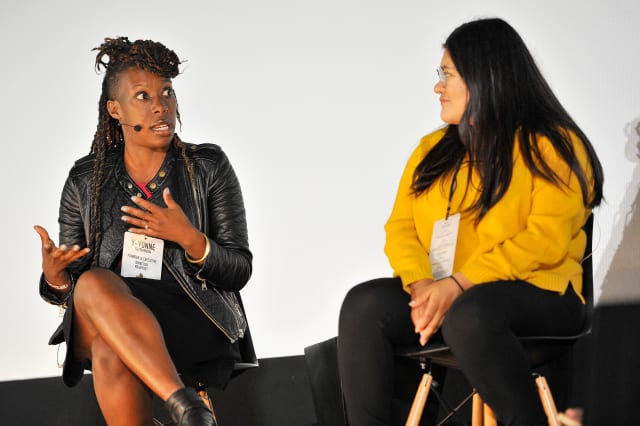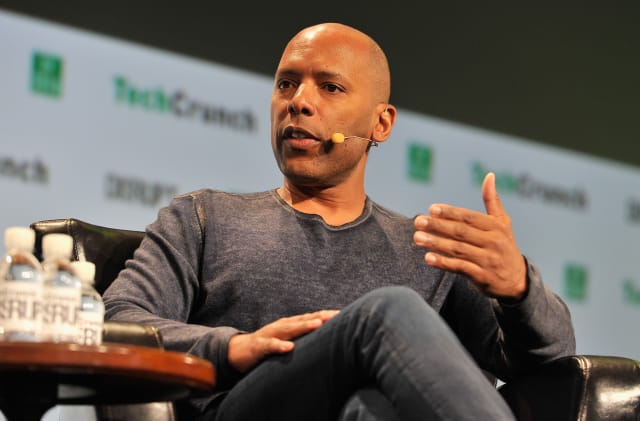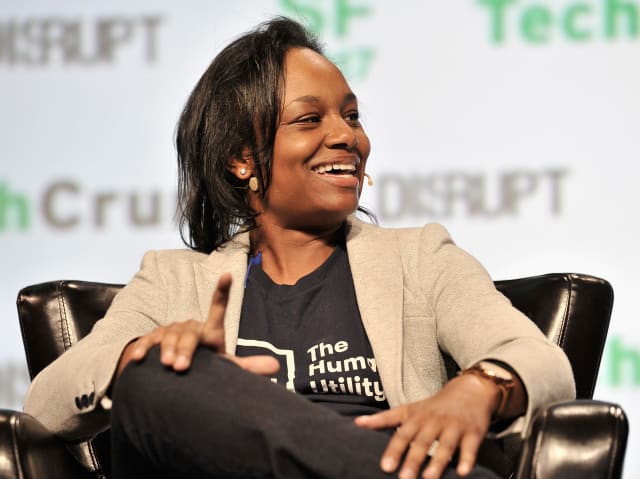Tech News
Black voices in tech: We want change, not just charity
But for many Black people in the tech community, the statements don’t carry a lot of weight. David Dylan Thomas, a Content Strategy Advocate for Thinkcompany, and who’s also working on a book called Design for Cognitive Bias, said that these statements remind him a lot of the platitudes companies gave about the coronavirus. “There…

But for many Black people in the tech community, the statements don’t carry a lot of weight. David Dylan Thomas, a Content Strategy Advocate for Thinkcompany, and who’s also working on a book called Design for Cognitive Bias, said that these statements remind him a lot of the platitudes companies gave about the coronavirus. “There were all these companies saying that ‘we’re all in this together’ and that they care about us. About 99.9 percent of it, I could care less what they say,” he said. “Everyone felt like they had to say something. It wasn’t so much about furthering a particular goal or agenda; it was just so they wouldn’t be left out.”
Y-Vonne Hutchinson, the CEO and co-founder of ReadySet, a diversity solutions firm that works primarily with the tech industry, acknowledges that it’s good that the companies are even willing to release such statements. (Hutchinson is also a co-founder of Project Include, a non-profit group dedicated to increasing diversity in tech.) “A couple of years ago, most companies weren’t even willing to say the phrase ‘Black Lives Matters,” she said. “I think it’s a positive indication that the Overton Window has moved to such a point where it feels obligatory for companies and brands to come out in support of the movement.”

Steve Jennings via Getty Images
However, Hutchinson thinks that words aren’t nearly enough. “These statements aren’t necessarily backed by real action,” she said, pointing out that the words ring hollow when the companies themselves do not have a good history of diversity and amplifying Black voices.
“For me, I don’t even look at these statements any more,” said Hutchinson. “I look at diversity reports. I look at the investment in your teams. I look at your executive team and your leadership team. To me, that’s a real indication of your commitment to change. If you’re not hiring, promoting, being led by and investing in Black people, and if you’re not firing the people who are racist, then you know a statement doesn’t mean so much.”
Diversity and inclusion has been the sticking point with the tech industry for the better part of the last decade. Over the past five years since tech companies have started releasing diversity reports, little has changed. According to recent reports, Blacks comprise only three percent of employees in the top 75 Silicon Valley tech companies. In non-tech companies, on the other hand, they make up around 24 percent of the workforce. The situation is even worse with technical jobs — the number of Black technical employees at Google and Facebook has risen by less than a percentage since 2014 (from 1 to 2 percent), while the percentage of Black tech workers at Apple remained at 6 percent for the past five years.
Often, the lack of diversity and Black people in tech is attributed to an educational pipeline problem; that they simply aren’t interested in these careers. The National Science Foundation, however, uncovered that 20 percent of computer science graduates are Black and Latinx, which does not at all square with the fact that they only make up 6 percent of the tech industry.
“If [these tech companies] really want to make a difference, look at their workforce,” said Leslie Miley, a former CTO of the Obama Foundation. Miley also previously worked as an engineering lead at Google, Slack, Apple and Twitter. “The percentages of African-Americans in tech roles have not moved in spite of months and years of platitudes by executive staff.”

Steve Jennings via Getty Images
Miley also called out companies like Google, which have either severely reduced or eliminated diversity programs in recent years. “These programs are defunded at the drop of any type of bad economic news,” he said. “If they were truly on the side of righteousness, truly on the side of justice, truly on the side of Black Lives Matters, then Black projects would benefit. Underrepresented people wouldn’t be cut when there’s an economic downturn because that would not be optional. They would be required. I’d like to see some real commitment to these causes that go beyond what’s happening in the news cycle.”
Tiffani Ashley Bell, the founder of Human Utility — a platform to help people in Baltimore, Detroit and other cities pay their water bills — wrote a Medium post entitled “It’s Time to Call out White Supremacy in Tech.” In it, she asked serious questions to her peers:
“Are we willing to reckon with investors who think investing in Black entrepreneurs is an act of charity — and thus, offer embarrassing, token amounts? Are we willing to stop sponsoring and attending technology conferences with mostly white male speaker lineups? What are we willing to do differently to dismantle white supremacy in the technology sector and because of technology’s pervasive influence, dismantle white supremacy in society?”
Bell also said that while many non-Black people in tech don’t think of themselves as overt racists, there’s often implicit bias at play. “Have you looked at the tone and the content of your Black employees’ performance reviews? Are you sure they were evaluated on their work performance and not their performance of culture fit? Code switching is a mental tax on Black people in the workplace that sometimes isn’t refunded when reviews come around. And this constant stress negatively compounds over the long term.”

Steve Jennings via Getty Images
Both Bell and Hutchinson believe it’s also important to promote Black employees to leadership positions. “It’s really hard to have a voice if you’re an entry-level person and you’re worried about pissing off your manager,” said Hutchinson. “If you look at the leadership team of some of these companies, there are no Black people there. If you want to hear powerful Black voices, then promote powerful Black voices. Have them on your executive and your leadership teams and empower them to speak out.”
On top of hiring and promoting Black employees, Bell also said to look at hiring from a more diverse pool of people such as historically Black colleges, and to examine existing practices: “For builders, are you willing to interrogate how your work may facilitate racism? I am reminded of Google’s photo categorization algorithms that classified Black people as gorillas. A more diverse team would have caught that before it went live.”
“Same with Airbnb and its problem with discriminatory hosts,” she continued. “To avoid racism while traveling, Black people created The Green Book. So, of course, they would have anticipated some white hosts not wanting Black guests and built a way to handle that early. This underscores the importance of having people on your team who can point out issues before they become PR problems. Do you?”
Frustrated with the lack of action in the industry, Mimi Fox Melton and Karla Monterroso of Code2040, a a non-profit dedicated to mobilizing racial equity in tech, wrote an op-ed published in Fast Company where they said protesting isn’t enough:
“What we need is for you to commit to this work for the rest of your lives, to strengthen your resilience so that you don’t tire as soon as this moment has passed, and to start with the very hard work of looking at yourself and the anti-Blackness and white-superiority you have internalized and perpetuated—and the many ways in which it has shown up in your work and life.
Tech’s inability to diversify its workforce as it defines the future puts all of us in danger. Racial representation and equity means creating the economic, physical, psychosocial, and social conditions at your workplace where Black, Latinx, and Indigenous people can thrive. In the absence of Black, Latinx, and Indigenous people—especially Black, Latinx, and Indigenous women—involved in the creation and design of technology, tech is ignorant of the potential repercussions of building the world in such a slanted way.”
Of course, much of this was also said years ago when tech companies first issued diversity reports, and Floyd’s death is obviously not the first time an unarmed Black man has been killed by the police. That’s why Miley said that simply giving a statement at the heat of the moment is not enough. It needs to be long-term, and the change needs to be structural.
“I appreciate that they’re giving to the cause,” said Miley. “But you know, this has always been an issue. Thank you for showing up now, and I hope you show up again in six months, and in a year, and in five years. I hope you fund your internal programs and I hope that you and your teams go and learn about systemic and structural discrimination.”
Unfortunately, Miley said that much of the problem comes from the very top. “I can tell you first hand, at least from being at Google, that there are people in the executive level who do not believe that there is structural discrimination and racism,” he said. “They don’t believe that it’s a real thing. It was almost impossible to get the message across because they just don’t believe it.”
“I do believe that a lot of this stuff is structural, and it’s hard for somebody who’s rank and file to change structural stuff,” said Hutchinson. Still, there’s something about this moment that might mean things could be different this time around. “For me, it’s really encouraging to see these organizations who are trying to pivot to the moment,” she said, citing cases of employees walking out as a form of protest. “There’s still a role for an individual employee to play. Whether it’s intervening when you see fights happening, making sure that your colleagues aren’t punished for reporting bias. If you’re not in executive leadership, but you’re still a manager, you can make sure you’re sponsoring Black people, recommending Black people, highlighting what Black people say in meetings, and just highlighting their work.”
Additionally, Hutchinson believes that people are getting angrier and more upset, and the tech industry doesn’t have the clout it once had. “The shine has come off the tech industry,” she said, citing examples such as Facebook’s recent refusal to take down misinformation. “They built these products without thinking about the societal impact, and with a very narrow view of what we need. It’s had a very detrimental impact on society.”

Real Life. Real News. Real Voices
Help us tell more of the stories that matter
Become a founding member“I think some tech companies are still in the place where they think they can do a little bit, tweak around the edges, keeping things the same and it’s going to go away,” she said. “I don’t think they’re quite equipped to handle the revolutionary nature of this moment. There’s not necessarily going to be a ‘normal’ that we go back to after all of this.”
But, she believes that it behooves these organizations to adapt to the times and to own the change that’s coming. “We always talk about innovation and Silicon Valley and being ahead of the curve. So, look what’s happening now. There’s a societal upheaval. And, if you want to be on the front lines and really innovating in that environment, you have to respond to it. You can’t be in denial about it.”

David Dylan Thomas
Thomas said that these are extraordinary times, which calls for more meaningful gestures than simply just saying tech companies should hire more Black people. For example, he praised the actions of Alexis Ohanian, who stepped down from Reddit so that a Black person could replace him. He also was impressed that companies like IBM and Amazon have said they would stop facial recognition systems, at least for the time being. “To me, that’s making a statement. That’s taking things seriously. When you see companies do things like leaving money on the table, that’s serious.”
“It’s not enough to just say ‘Black Lives Matter.’,” he said. “You need to actually do something. You have to ask yourself, ‘What concrete steps are you taking? What are you prepared to do? What is the actual action that’s going to happen here?”
To that end, Thomas gave a few different tips, such as having anonymous resumes in the hiring process so that people don’t give into implicit biases around names. He also suggests that when making decisions around a diversity-focused project, to be sure to actually hire diverse people. So, for example, if you’re designing something for women, instead of having interviews with a bunch of women, to simply hire more women for the job.
“The good news is that the concept of design justice or inclusive practices aren’t new,” said Thomas. “The hard work is actually implementing it. That’s where most people fall short.”
Several of the aforementioned tech companies have said they would donate a certain amount of money to Black-focused charities as well. Zuckerberg said Facebook would donate $10 million to racial justice causes, YouTube announced it would give $1 million to the Center for Policing Equity, Amazon said it would donate $10 million to various causes such as the NAACP and the ACLU, and Apple recently pledged $100 million to a Racial Equity and Justice initiative.
While that’s good, Miley said that just isn’t enough. “I think giving money to causes is great,” he said. “But you have to invest in the community.” Instead, he said that what they’re doing is simply charity, partly as a way to get good PR. “I don’t want charity. I want investment. Stop pandering to us with charity, and start partnering with us in investment.”
All products recommended by Engadget are selected by our editorial team, independent of our parent company. Some of our stories include affiliate links. If you buy something through one of these links, we may earn an affiliate commission.



